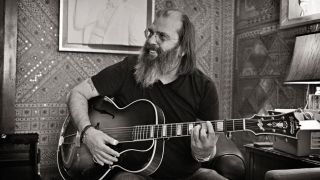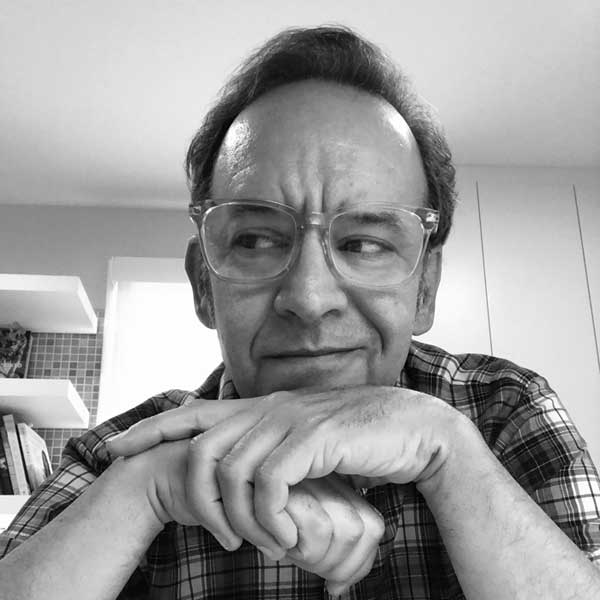I do have this archaic thing about me,” says Steve Earle with a chuckle. He’s not talking about his upcoming 60th birthday or his long, greying beard, but rather an ongoing affinity for mining rich veins of classic American music. On his latest album Terraplane, it’s rock-solid blues, with eleven tales of loneliness, love gone wrong and hair-raising encounters with mean women and ol’ Scratch himself. Talking on the phone from his apartment in New York, Earle is candid about getting older, staying relevant and the end of his marriage to singer Allison Moorer.
What was your introduction to the blues?
Growing up in Texas, I saw Freddie King a lot. I saw Johnny Winter. When I was in junior high school, ZZ Top were still playing the odd prom around Texas. Those first two albums they did before Tres Hombres are as much a part of my definition of the blues as anything. One of the people who really helped me out musically, besides Townes Van Zandt, was Rocky Hill. Rocky’s brother Dusty plays bass with ZZ Top. Rocky’s gone now – he passed away about five years ago. But Rocky, Dusty and Frank Beard were originally a trio called American Blues. I saw Rocky a lot. He’s kind of the lost, great Texas blues guitarist.
Twenty years ago you said, “I don’t play a lot of blues tunes. I don’t think I’m good at them.” What changed?
I was talking about electric blues more than acoustic blues. Looking back, I was OK at acoustic blues. In ’94 I recorded South Nashville Blues. My fingerpicking is pretty good on that. But coming from Texas, I was very apprehensive about electric blues. Blues is a very serious thing there. What got me over it was that I have a guitar player in the band right now, Chris Masterson, that can really fucking do this, because he started out doing it in Texas. It pushed me to up my game. My harp playing has gotten a lot better. I took it off the rack and plugged it into an amp. And I’ve always written a blues song here and there on my records, but this time I kept writing them. So I made a decision early on: this is a blues record. And I’ve made records where I decided, “Okay, I need some kind of template for this sonically.” Transcendental Blues, the template was Revolver. This record, the template is Howlin’ Wolf, Canned Heat and those first two ZZ Top albums.
You’ve done rock, country, folk, bluegrass. Does it feel like stepping from one stream of American music into another?
It’s interesting because the last time I felt this good about a record was the bluegrass record. It’s a box to put yourself in, but it’s a box that pushes you, because with blues, there are fewer crayons in the box [laughs]. But I’m expected to perform to a certain level as a lyricist, and it doesn’t matter if it’s a blues or bluegrass song. It’s a challenge to bring my own thing to it.
We’re sorry to hear about your divorce. Do you feel like songs can give you a deeper understanding of what was right and wrong in a relationship?
I don’t know. I’ve been married a lot, but most of that was in the eighties, when I was on drugs. This is the longest I was ever married, and it was a drag to split up. There’s a little boy involved, so I don’t really like to talk about it too much. The divorce is still going on. I know everyone will think this is a divorce record, and in some respects they’re not wrong. There are parts of it, if I was really smart, I probably would have left off, but I’m not a guy with a lot of extra songs lying around. I don’t waste time finishing stuff that’s not there. This is the record that I had in me at this point in my life. The reality of the business is I have to put out a record every eighteen to twenty-four months and do a tour, because that’s how I make my living.
Are there young songwriters looking to you in the same way you looked to Guy Clark and Townes Van Zandt?
I feel like what I do as a songwriter is almost extinct. It’s a job that Bob Dylan basically invented. There were songwriters who wrote at a really high artistic level before then. Cole Porter certainly did. But for a while, songwriting was an art form. I’m not sure that’s true any more. I think it’s back to being a craft rather than an art form. I think Bob Dylan elevated it to being a high art form, then immediately took all the fucking air out of the room because he was so good. And we’ve all been struggling in Bob’s wake ever since. But there are a few young writers out there. My kid Justin is pretty good. His best songs are as good as anybody’s. Willy Mason is really fucking good. So is Joe Pug. Conor Oberst is really interesting. Sturgill Simpson is really good.
Do you picture yourself like Bill Monroe or George Jones, performing and recording until your last breath?
I hope I don’t become a parody of myself the way George Jones did. I’ll perform as long as I can. The next move for me, believe it or not, is musical theatre. I’m in the process of developing [2007 album] Washington Square Serenade into a musical. A lot of people have gotten their asses knocked off trying to do it, but I think I’m a better writer than most of the people who are trying to do it, and I might pull it off. I have the advantage of having written one play. I love theatre. What I spend my money on these days is three things: live theatre, Major League Baseball and fly fishing.
You’re about to turn sixty. What would you say are the pros and cons of getting older?
You’ve got to understand, when I look in the mirror head on I look like me in that portrait that Jim McGuire took in 1975 that you see around every once in a while. Now, if I’m walking past the mirror and I catch myself out of the corner of my eye, I’ll go: “Fuck, who is that old man?” I don’t think anybody sees themselves as the age they are. I don’t feel old, even though I guess I’m officially past middle age now. There are more things I feel like I do better than things I do worse than I did when I was thirty and forty. And even at my age, I still shop in skate shops. But I do wear a sport coat when I fly sometimes now, because I figured out that I get fucked with less.
Terraplane is released on February 16 via New West.



